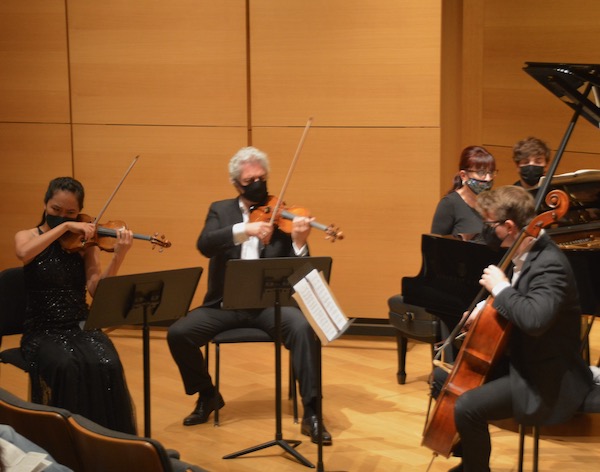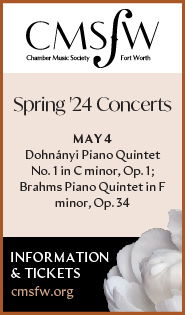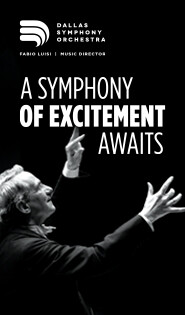Chamber Music Society of Fort Worth returns live with Hollywood gold

Following a completely virtual season last year, the Chamber Music Society of Fort Worth opened its 34th season with glorious playing and intriguing, thought-provoking repertoire Saturday afternoon at the Modern Art Museum of Fort Worth.
As indicated by its apt title, “So Much More Than Tinseltown,” the program found its roots in the early 20th century canon with two suites by legendary film composer Erich Wolfgang Korngold sandwiching Frank Martin’s Piano Quintet.
Korngold distilled a delightful range of moods—from excitement to intimacy—in his Suite from the Incidental Music to Much Ado About Nothing, arranged for violin and piano. Young violinist Danbi Um made an exemplary Fort Worth debut in this alluring opener, accompanied by pianist Baya Kakouberi.
The four-part duo piece, distilled from Korngold’s five-movement orchestral suite, portrays the range of personalities across Shakespeare’s characters and captures in brilliant brevity some of the emotional progression of the movie’s plot—Beatrice and Benedick’s acrimony and subsequent attraction, Hero’s nervous uneasiness, drunkenly satirical guardsmen, and the jubilant celebration of the two young lovers’ reunion. Um played with varied expression and a command of storytelling. Her lyrical phrasing and clarity of tone, most notable in the overture and in her Intermezzo solo, were supported by consistently sturdy piano accompaniment.
Martin’s Quintet predates the composer’s adoption of twelve-tone strictures, though elements of the Swiss composer’s proclivity for the technique are evident in the musical language, and yet no small amount of drama and narrative flow.
CMSFW artistic director Gary Levinson, led the full ensemble with affectionate phrasing and insight in the many changes of tempo. Violist Dmitry Kustanovich and cellist Allan Steele (principal cellist for the Fort Worth Symphony) offered precision and warmth to Martin’s dissonant phrases. Um and Levinson were full of fervor in the Presto, the work’s fourth and final movement, set against the more tempered voices of the rest of the ensemble. On occasion, Levinson’s violin tended to dominate in fortes and fortissimos, however the acoustic of MAM’s auditorium aided an even balance.

The final work of the program, which filled the second of half of the concert, was Korngold’s rarely performed Suite for Piano Left Hand, Two Violins, and Cello. It is a massive work, both in texture and emotional weight. Completed in 1930, the piece was commissioned by Austrian pianist Paul Wittgenstein, who lost his right arm in the First World War and commissioned works from many leading composers, including Ravel and Prokofiev.
The true success of this suite, through a combination of Korngold’s lush, innovative melodies and the pianist’s virtuosic technique, is to make the listener forget that only one hand is available.
Kakouberi delivered here with startling effect, with a notable reconciliation of expression and attentiveness, making the piano the obvious star of the piece throughout, as Korngold intended. She was commanding in the opening cadenza of the first movement, while appropriately tender in the second movement waltz and in the slow fourth movement—the “emotional heart” of the Suite, according to Korngold’s biographer, Brendan Carroll.
The ensemble navigated the metric playfulness of the central Groteske with apt wit. The final movement, labeled a Rondo, plays with the concept of variations on a main theme, which was introduced tidily by Steele. Racing through dizzying flourishes in tutti, the program concluded with a triumphant final chord strike and a boisterous standing ovation.
The Chamber Music Society of Fort Worth’s return to in-person performances was also a true return to form. Levinson’s direction in this program of neglected rarities was enhanced by the artful execution of these first-class musicians, yielding a strong opening to the season.
The next CMSFW program is “Colors of Affection” on October 16 featuring works by Zemlinsky, Berg, and Mendelssohn. cmsfw.org


